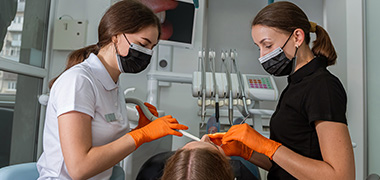
How do I become a dental hygienist?
Advanced Diploma of Oral Health (Dental Hygiene)
- There are no mandated entry requirements.
 TAFE SA
TAFE SA
Certificate IV in Dental Assisting
- Completed Certificate III in Dental Assisting or equivalent qualifications
 Foundation Education
Foundation Education
Bachelor of Oral Health
- There are no mandated entry requirements.






Bachelor of Dental Science (Honours)
- There are no mandated entry requirements.


Related occupations
Dental Technician
A Dental Technician creates dental appliances like dentures and mouthguards by taking impressions and using various materials and techniques.
Oral Health Therapist
An Oral Health Therapist enhances clients' dental health by examining mouths, providing advice, designing preventative programs, and performing minor procedures.
Dental Assistant
Dental Assistants support dentists during treatments, manage equipment, advise on oral care, and may conduct x-rays if qualified.
Prosthetic Technician
A Prosthetic Technician creates and repairs dental prosthetics like dentures, using moulds and various construction techniques.
Dental Nurse
A Dental Nurse assists dentists with patient care, prepares equipment, operates instruments, and manages administrative tasks, requiring strong communication and attention to detail.
Dental Prosthetist
A Dental Prosthetist prepares prosthetic appliances, makes dentures and mouthguards, assists with fittings, and requires strong customer service and attention to detail.
Dental Lab Assistant
A Dental Lab Assistant supports dental practices by taking impressions, creating custom mouthpieces, and performing repairs while ensuring excellent customer service.
Dentist
A Dentist examines and treats oral health issues, performing cleanings, fillings, extractions, and sometimes orthodontic procedures.
Treatment Coordinator
A Treatment Coordinator creates dental treatment plans, discusses costs, insurance, and payment options, ensuring clear communication and detail.
Orthodontist
Orthodontists straighten teeth, fix jaw alignment, fit braces and aligners, and perform dental surgery while ensuring patient care.
Periodontist
Periodontists specialise in treating gum diseases and perform surgeries to install dental restorations, requiring strong communication skills and expertise.
Prosthodontist
Prosthodontists specialise in creating and fitting prosthetic devices for patients with missing teeth or facial deformities, ensuring functional and aesthetic outcomes.
Endodontist
Endodontists specialise in treating tooth pulp issues and perform procedures like root canal therapy and dental implants, ensuring patients' teeth are restored.
Oral and Maxillofacial Surgeon
An Oral and Maxillofacial Surgeon performs surgeries on the mouth, jaw, and face, managing trauma and diseases to restore health and quality of life.
Paediatric Dentist
A Paediatric Dentist delivers dental care to children, focusing on treatment, preventive care, and educating families about oral health.
Common questions
How much does a Dental Hygienist earn?
In Australia, a full time Dental Hygienist generally earns $1,913 per week ($99,476 annual salary) before tax. This is a median figure for full-time employees and should be considered a guide only. As you gain more experience you can expect a potentially higher salary than people who are new to the industry.
What are the job opportunities for a Dental Hygienist?
This industry has seen an increase in employment numbers in recent years. There are currently 1,300 people working as a Dental Hygienist in Australia compared to 1,100 five years ago. Dental Hygienists may find work across all regions of Australia.
Source: Australian Government Labour Market Insights
How do I become a Dental Hygienist?
If this career interests you, consider enrolling in a Dual Certificate III in Dental Assisting and Certificate IV in Dental Assisting with Oral Health Promotion Specialisation. This course will give you the skills to assist with dental procedures and prepare individualised oral hygiene programs for your clients.
Further reading


What can you do with a Certificate III in Dental Assisting?
4th March 2021)

